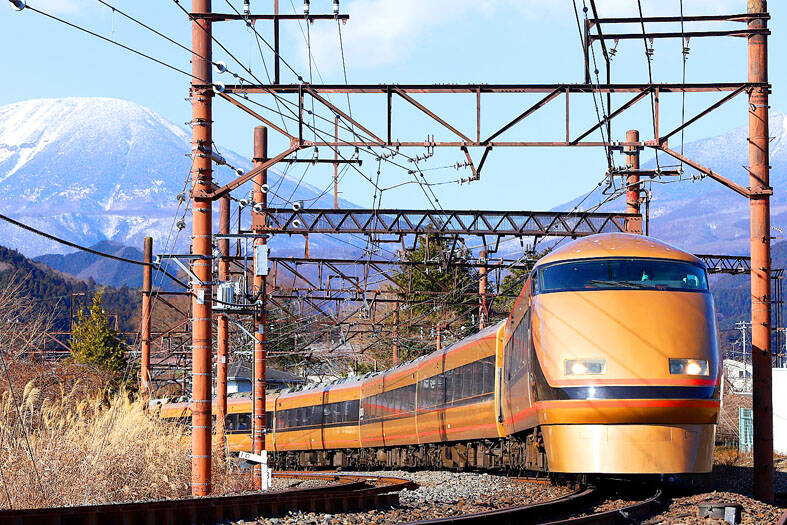Spacia 101-1, a tourism express train owned by Japan’s Tobu Railway Corp, is to be on display at the Taipei Railway Station in December, Taiwan Railway Corp (TRC) said yesterday.
The exhibition is to be held on Dec. 18 to celebrate the 10th anniversary of the establishment of a friendship between the railway firms.
Manufactured since 1990, Spacia trains mainly operate in the Asakusa area, Nikko City and Kinugawa hot springs in Japan.

Photo courtesy of Taiwan Railway Corp
The train was created to celebrate the 400th anniversary of the Toshogu Shrine, with its gold-and-red exterior reportedly being inspired by the Toshogu Shrine, the Futarasan Shrine and the Rinnoji Temple.
The train was the first produced by Tobu Railway for Spacia tourism express trains, TRC said.
“The locomotive’s first exhibition in Taiwan shows that the two railway firms value the importance of railway exchanges. It also symbolizes the commitment to continue the friendship through railways,” it added.
As TRC and Tobu Railway signed their friendship agreement on Dec. 18, 2015, they have initiated plans to boost visitors to the two railway systems, including jointly promoting and marketing the two railway systems and participating in the Formosa Railroad Bento Festival, the TRC said.
As Tobu Railway has extensive experience in managing its assets, including the Tobu Museum and Tokyo Sky Tree, the TRC plans to visit the Japanese railway’s headquarters and learn from it, it said, adding that both companies are seeking more opportunities for cooperation.

Taiwanese scientists have engineered plants that can capture about 50 percent more carbon dioxide and produce more than twice as many seeds as unmodified plants, a breakthrough they hope could one day help mitigate global warming and grow more food staples such as rice. If applied to major food crops, the new system could cut carbon emissions and raise yields “without additional equipment or labor costs,” Academia Sinica researcher and lead author the study Lu Kuan-jen (呂冠箴) said. Academia Sinica president James Liao (廖俊智) said that as humans emit 9.6 billion tonnes of carbon dioxide compared with the 220 billion tonnes absorbed

The Taipei Mass Rapid Transit (MRT) Wanda-Zhonghe Line is 81.7 percent complete, with public opening targeted for the end of 2027, New Taipei City Mayor Hou You-yi (侯友宜) said today. Surrounding roads are to be open to the public by the end of next year, Hou said during an inspection of construction progress. The 9.5km line, featuring nine underground stations and one depot, is expected to connect Chiang Kai-shek Memorial Hall Station to Chukuang Station in New Taipei City’s Jhonghe District (中和). All 18 tunnels for the line are complete, while the main structures of the stations and depot are mostly finished, he

Taipei is to implement widespread road closures around Taipei 101 on Friday to make way for large crowds during the Double Ten National Day celebration, the Taipei Department of Transportation said. A four-minute fireworks display is to be launched from the skyscraper, along with a performance by 500 drones flying in formation above the nearby Nanshan A21 site, starting at 10pm. Vehicle restrictions would occur in phases, they said. From 5pm to 9pm, inner lanes of Songshou Road between Taipei City Hall and Taipei 101 are to be closed, with only the outer lanes remaining open. Between 9pm and 9:40pm, the section is

China’s plan to deploy a new hypersonic ballistic missile at a Chinese People’s Liberation Army Rocket Force (PLARF) base near Taiwan likely targets US airbases and ships in the western Pacific, but it would also present new threats to Taiwan, defense experts said. The New York Times — citing a US Department of Defense report from last year on China’s military power — on Monday reported in an article titled “The missiles threatening Taiwan” that China has stockpiled 3,500 missiles, 1.5 times more than four years earlier. Although it is unclear how many of those missiles were targeting Taiwan, the newspaper reported